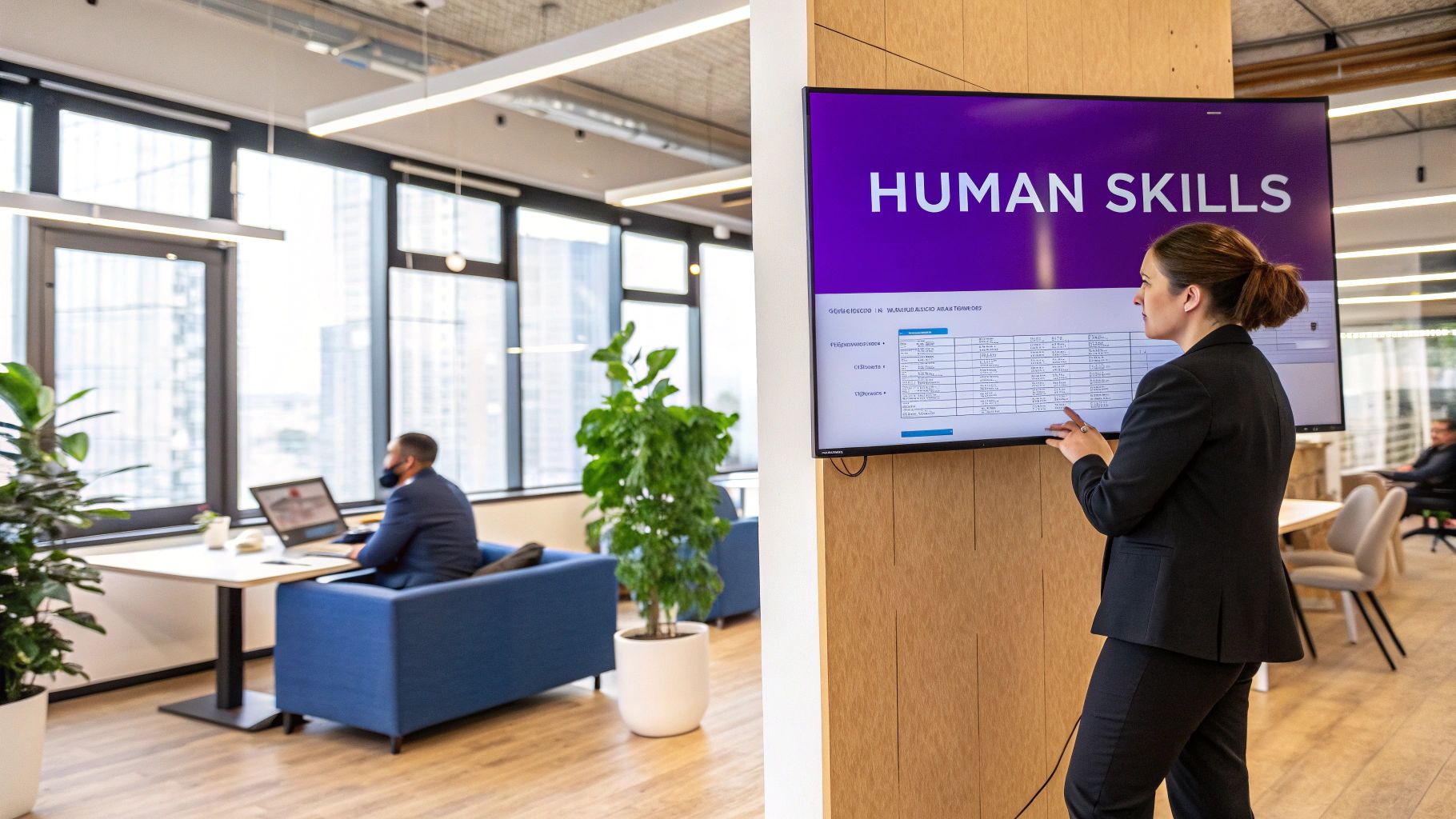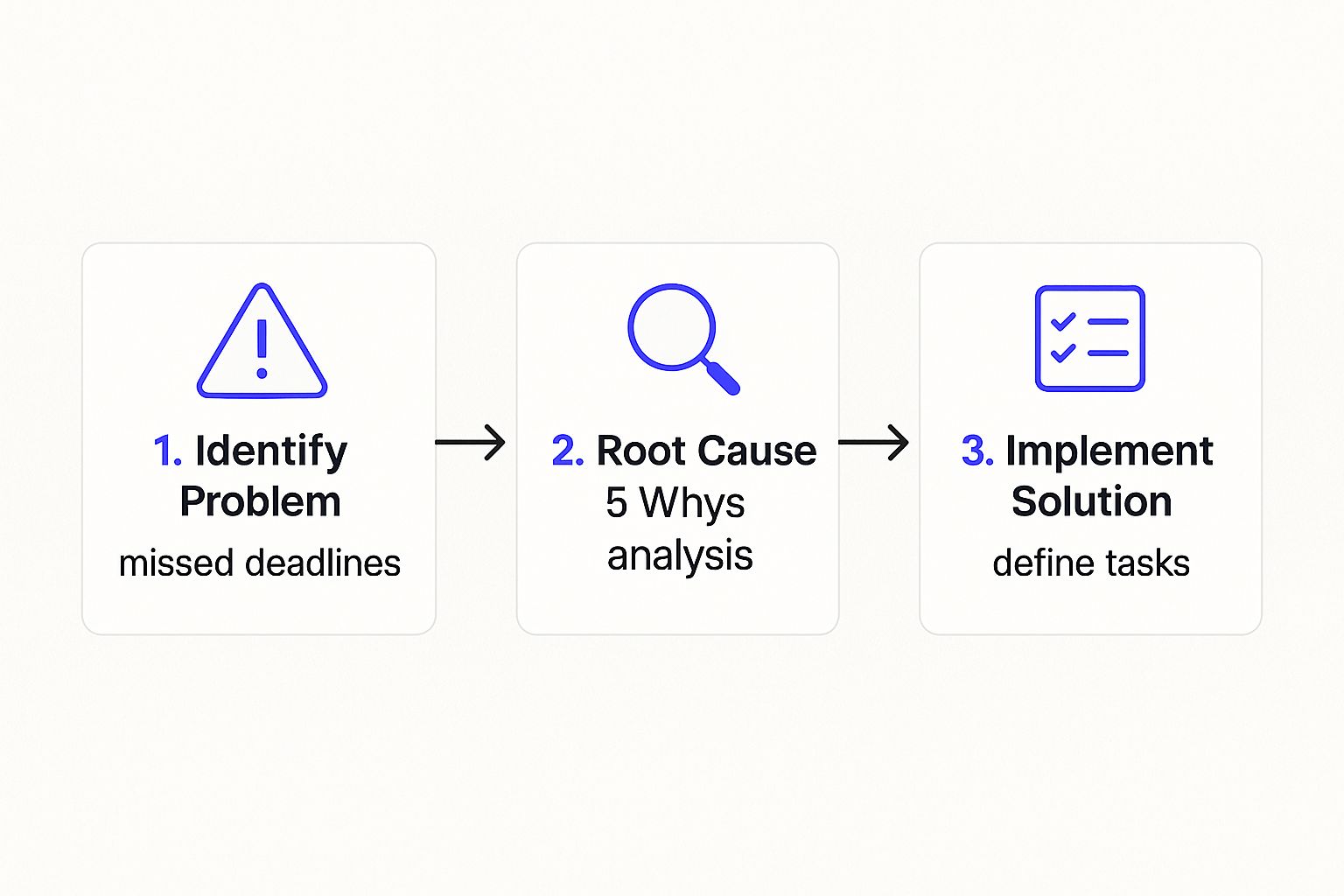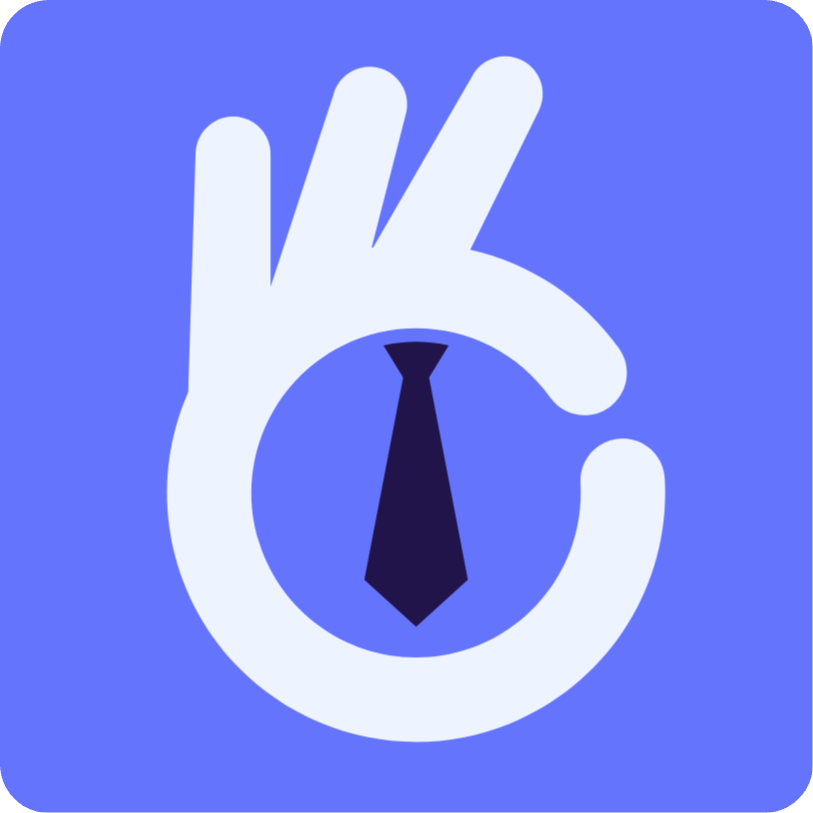How to Develop Soft Skills: Top Strategies for Success
Let’s be honest: getting your foot in the door often comes down to your technical skills. But what keeps you there—and helps you climb the ladder—are the skills that can't be listed on a certification. We're talking about soft skills.
Building them isn't magic. It's a simple, deliberate process: figure out where you're weak, find low-stakes ways to practice, and then make those new habits a core part of how you work.
Why Your Technical Skills Are No Longer Enough

In a world where automation can handle the repetitive stuff, it’s the uniquely human skills that set you apart. Think about it. You can have a brilliant coder who can't explain their work to the team, and what do you get? A bottleneck. Or a data analyst who pulls incredible insights but can't tell a compelling story with the numbers, leaving everyone uninspired.
This is the new reality. Your hard skills might get your resume through the first filter, but it's your ability to communicate, collaborate, and think on your feet that will land you the job and define your career trajectory.
The Big Shift in What Companies Want
This isn't just a passing trend. It's a fundamental change in what employers are desperately looking for. As technology gets smarter, the skills that are hardest to automate—like creativity, persuasion, and emotional intelligence—become the most valuable assets you can bring to the table.
This is especially true if you’re just starting out. Our guide on https://www.eztrackr.app/blog/how-to-get-hired-with-no-experience dives deep into how you can show off these skills to prove your potential, even without a long work history.
Data from the World Economic Forum backs this up, showing a huge spike in demand for skills like leadership, social influence, and analytical thinking. In fact, they predict that 39% of the core skills needed for the average job will change by 2030. That’s a massive shift, and it means adaptability is non-negotiable.
Here’s a quick look at the soft skills that are becoming non-negotiable for employers and what they actually look like day-to-day.
Top In-Demand Soft Skills and Their Workplace Impact
| Soft Skill | What It Looks Like in Practice | Why Employers Value It |
|---|---|---|
| Communication | Clearly explaining a complex idea in a team meeting or writing a concise, actionable email. | Prevents misunderstandings, aligns teams, and ensures projects run smoothly. |
| Teamwork | Actively listening to a colleague's feedback and building on their ideas, even if you disagree. | Drives innovation, improves problem-solving, and creates a positive work environment. |
| Problem-Solving | When a project hits a roadblock, you identify the root cause and propose a solution instead of just pointing out the issue. | Shows initiative, resilience, and the ability to turn challenges into opportunities. |
| Adaptability | Seamlessly switching priorities when a project's direction changes, without getting flustered. | Crucial for navigating fast-paced industries and keeping teams productive during change. |
| Leadership | Taking ownership of a small project or mentoring a new team member, regardless of your official title. | Signals future potential, builds trust, and helps scale the team’s capabilities. |
These are the skills that separate a good employee from an indispensable one.
It's All About Your Professional Presence
At the end of the day, your success hinges on more than just what you know. It's about how you show up and interact with the people around you.
The most valuable people in any organization are the ones who combine deep technical knowledge with strong interpersonal skills. They're the innovators and leaders who actually push things forward.
It’s also crucial to remember that your presence extends online. Today, understanding the impact of your digital footprint on job opportunities is just as important as a polished resume. A candidate who can think critically and collaborate with a team will always have an edge over a lone genius who can’t.
Take a Hard Look at Your Soft Skills

Before you can build up your soft skills, you need to know where you stand. And no, I'm not talking about some generic online quiz. A real skills audit is about getting your hands dirty and looking at your actual on-the-job experiences to see where the real growth opportunities are.
The whole point is to move beyond a vague thought like, "I guess I need to communicate better," and zero in on something tangible you can actually work on.
Think about your most recent projects. Start with a win. When did something go incredibly well? What part did you play in that success? Maybe you were the one who kept everyone's spirits up during a crunch week, or perhaps you were the person who finally explained a complex spec to a stakeholder in a way they actually understood. Those moments are gold—they show you what you're already good at.
Now, flip the script. Think about a project that was a total grind or a time when wires got crossed. Don't play the blame game. Just analyze what went down. Did you hesitate to ask a clarifying question and end up running with a bad assumption? Did you have a hard time getting your point across in a heated debate?
These aren't failures. They’re data points.
Get an Outside Opinion (The Right Way)
Looking in the mirror is a great start, but it only shows you one angle. To get the full picture, you absolutely need an outside perspective.
But here’s the thing: just walking up to someone and asking, "Hey, what are my weaknesses?" is awkward for everyone and almost never gives you anything useful. You've got to be more strategic.
Find a trusted former colleague, a mentor, or even an old manager you had a good relationship with. Instead of hitting them with a broad, vague question, ask about specific situations. It makes it way easier for them to give you something concrete.
Here are a few ways you could phrase it:
- "I'm really trying to get better at how I contribute to team projects. Thinking back to that X project, was there a time you thought my input could have been clearer?"
- "I want to work on how I handle curveballs. Do you remember my reaction when the client suddenly moved up the deadline? What's one thing I could have done differently there?"
- "I'm trying to make my presentations more effective. In that last team meeting, what was your biggest takeaway from my update? Was there anything that didn't land?"
The trick is to ask for observations on your actions in a specific moment, not a judgment of your personality. This approach gets you constructive, actionable advice you can actually use.
Once you have this feedback, start looking for patterns. If you hear from two different people that your emails can sometimes be confusing, or that you're a natural at mediating disagreements, you’ve found your starting points.
Your goal is to boil all this self-reflection and feedback down into two or three specific, actionable goals. "Get better at communication" is way too broad. But "Present my ideas more confidently in team meetings"? Now that’s something you can work on. This focused approach is a key part of any good professional development planning and turns a huge task into something you can actually tackle.
Mastering Communication and Interpersonal Skills

It’s easy to think of great communicators as just being naturally gifted. The truth is, clear communication is a skill you can build with deliberate practice. It’s so much more than just speaking well—it's about making others feel heard and connected to your message.
Don't just take my word for it. Research from Harvard University found that 85% of job success comes directly from well-developed soft skills, with communication leading the pack. We’re not talking about memorizing fancy words here. It's about breaking down how we interact into its core parts: listening, clarity, and connection. Then, you just have to practice each one.
Become a Master of Active Listening
Real listening isn’t just waiting for your turn to talk. It's an active process. When you truly listen, you’re absorbing not just the words but the emotion and context behind them. This is how you build trust and head off the kind of misunderstandings that can derail entire projects.
Let’s say you’re in a meeting and a colleague mentions a vague concern about the project timeline. Instead of immediately jumping in to defend the schedule, try this:
- Paraphrase and Confirm: "So, what I'm hearing is you're worried we haven't budgeted enough time for the testing phase. Is that right?" This simple step shows you're actually paying attention and gives them a chance to clarify what they mean.
- Ask Open-Ended Questions: Follow up with something like, "Can you walk me through what you see as the biggest risks there?" It’s a far more effective question than a blunt "Why?" and invites a more detailed, thoughtful response.
Active listening is a superpower. By making someone feel truly heard, you not only gain critical information but also build the psychological safety needed for honest collaboration and innovation.
Prioritize Clarity in Every Interaction
Confusion is the enemy of progress. Whether you're firing off a quick email or explaining a complex idea in a tense meeting, your number one goal should be absolute clarity. Vague language just leads to wasted time, frustration, and sloppy work.
Think about the classic follow-up email after a meeting. A weak, unhelpful email might say, "Let's touch base on the action items soon." That's useless because nobody knows what to do next.
A strong, clear email is specific: "Thanks for the great discussion. As a next step, I will draft the project proposal and send it to you for review by EOD Wednesday. Please provide your feedback by Friday so we can finalize it."
See the difference? This simple shift provides direction, sets clear expectations, and establishes accountability. Practicing this level of clarity is a direct way to build skills that get results—which is especially crucial when you need to know how to prepare for a job interview and prove your professionalism.
Build Genuine Professional Rapport
Finally, strong interpersonal skills are built on genuine rapport. This doesn't mean you need to be best friends with everyone at work. It just means forging connections based on mutual respect and understanding.
One surprisingly effective technique is mirroring, where you subtly match someone's language or tone.
If a client keeps using a specific phrase like "top-line growth," weave that phrase into your conversation. It's a small adjustment, but it signals that you're on the same page and aligned with their priorities. Mastering these nuances is vital in any professional setting, and you can explore more strategies for improving workplace communication skills to refine your approach.
Cultivating a Problem-Solving Mindset
Let's be blunt: companies don't hire people just to follow instructions. They hire them to think. If you want to stand out, developing a problem-solving mindset is one of the most powerful things you can do. It’s what turns you from a task-doer into someone who is truly valuable to the team.
This isn’t just a nice-to-have skill; it’s what employers are actively paying for. The global market for soft skills training was valued at a staggering USD 33.4 billion in 2024 and is on track to hit USD 92.6 billion by 2033. This massive investment is proof that companies are desperately seeking people who can think on their feet. You can dig into the specifics by reading the full market forecast here.
Look Beyond the Surface Symptoms
The first rule of real problem-solving? Refuse to accept issues at face value. It's so easy to spot a problem and slap a quick fix on it, but that’s like putting a bandage on a wound that needs stitches. True problem-solvers are the ones who dig deeper to find the root cause.
A brilliant, almost deceptively simple, tool for this is the ‘5 Whys’ technique. It’s a method for drilling down past the obvious symptoms to uncover what’s really going on.
For instance, say your team keeps missing project deadlines. A surface-level fix is "we need to work faster." A real problem-solver asks why.
- Why are we missing deadlines? Because critical tasks are finished late.
- Why are they late? Because the approval process takes too long.
- Why is it so slow? Because one project manager has to approve everything.
- Why is that manager a bottleneck? Because they’re required to sign off on every minor detail.
- Why must they approve every detail? Because the team doesn't have clear guidelines on what they can decide for themselves.
Boom. The problem wasn’t speed; it was a lack of autonomy. Now you have a real issue you can actually solve.
A problem-solving mindset is about curiosity, not just correction. It's the persistent desire to understand the 'why' behind the 'what,' which is where real solutions are born.
Practice on Low-Stakes Challenges
You don't need a five-alarm fire to build your problem-solving muscles. In fact, the best way to get good at this is to start small. Actively look for minor, low-stakes issues in your current job or even personal projects. This lets you practice without the pressure of a catastrophic failure.
Are there small, nagging inefficiencies in your team's workflow? Is there a repetitive task you could automate with a simple script? Is the shared drive a complete mess?
Tackling these little problems not only shows initiative but also gives you a safe playground to hone your diagnostic skills. It builds a track record that proves you’re a proactive contributor. A great way to manage these mini-projects is with a personal Kanban board, which helps you track your progress from identifying the issue to celebrating the fix.
Develop Your Analytical Thinking
Great problem-solving is always built on a solid foundation of analytical thinking. This just means getting into the habit of evaluating information critically, spotting patterns, and letting data—not just gut feelings—guide your decisions.
Start by questioning the information you're given. When a colleague presents a report, mentally ask yourself:
- Where did this data come from? Is it reliable?
- What information might be missing here?
- Is there another way to interpret these numbers?
When you make this a habit, you become the person who sees the opportunity—or the risk—that everyone else missed. This analytical edge is what turns you from a passive team member into a strategic thinker. And that is exactly the kind of person every company wants to hire and promote.
Putting Your New Skills into Practice
Knowing what soft skills you need to work on is one thing. Actually doing it is another game entirely. It's time to move from theory to action, turning those abstract goals into real, everyday habits.
Start small. Seriously. Pick one tiny, achievable goal for the week. If you're focusing on communication, maybe it's this: "This week, I will ask for clarification in at least one meeting instead of just nodding along." This isn't about some massive personality transplant; it's about building momentum through small, consistent wins.
Creating Your Feedback Loop
You can't get better in a vacuum. To know if what you're doing is actually working, you need honest feedback. That means getting specific and asking trusted colleagues for their real-world observations.
Don't just walk up and ask, "How'd I do?" It’s too vague and people will just tell you what you want to hear. Instead, anchor your question to a specific moment so they have a clear reference point.
Try adapting one of these scripts:
- For clarity: "When I walked through the project update in today's meeting, was any part of it confusing? I’m working on being more direct, so I’d love to know how I could have explained it better."
- For collaboration: "During that brainstorming session, was I doing a good job of building on other people's ideas? Or did I seem to shut things down? I'm trying to be a better creative partner."
- For problem-solving: "When we hit that roadblock with the supplier, how did my proposed solution come across? Was there an angle I completely missed?"
This turns skill development into what it should be: a cycle of trying something, getting feedback, and tweaking your approach.
True growth happens when you stop fearing criticism and start chasing constructive feedback. It’s the fastest way to see yourself through someone else's eyes and make adjustments that stick.
This isn't just about feeling good, either. It has a real impact. Some studies show that companies that focus on soft skills see a 26% increase in revenue growth. On the flip side, poor interpersonal skills cost businesses big time. You can dig into more of the data on the business impact of soft skills development to see just how much it matters.
This process flow shows how a problem-solving mindset can be put into practice by identifying an issue, digging into its root cause, and then putting a clear solution in place.

The graphic makes it clear that effective problem-solving isn't about finding a quick patch—it's a deliberate process that gets you from symptom to a real solution.
To make this even more concrete, let's build your own plan. A little structure goes a long way in turning good intentions into actual progress.
Your Personal Soft Skill Development Plan
Use this simple template to create a weekly action plan. Be honest with yourself and pick goals you can realistically tackle.
| Target Skill | Specific Practice Goal (This Week) | How I Will Measure Progress | Who I Will Ask for Feedback |
|---|---|---|---|
| Example: Active Listening | In my next team meeting, I will summarize the key takeaway before the meeting ends. | Did I successfully summarize the point without needing correction? | My manager (after the meeting) |
| Example: Teamwork | I will proactively offer to help a coworker on a challenging task, even if it's not my direct responsibility. | Did my coworker accept my help? Did we finish the task more efficiently? | The coworker I helped |
Revisit this plan at the end of each week. What worked? What didn't? Adjust your goals for the following week based on what you learned. This simple act of tracking your efforts is a powerful motivator.
Your Soft Skills Questions, Answered
Alright, so you're bought into the idea of working on your soft skills. But as soon as you try to move from theory to practice, the real questions pop up. It can feel a little fuzzy trying to apply these concepts in the real world.
Let's clear up some of the most common questions job seekers have.
I'm Unemployed. How Can I Possibly Practice These Skills?
This is a big one. It's easy to feel like you're in a holding pattern when you're between jobs, but I want you to reframe that. This isn't downtime; it's your personal development sprint. You have a unique opportunity to build skills without the daily grind getting in the way.
You just have to create your own practice field.
- Volunteer: Non-profits are almost always looking for help. It's a perfect, low-stakes environment to work on teamwork, communication, and solving real problems with a diverse group of people.
- Join a professional group: Don't just be a name on a roster. Jump into the discussions, volunteer for a committee, or help organize an event. You’ll be forced to network, manage small projects, and persuade others.
- Start a personal project: Seriously. Launch a blog, a podcast, or a small online community around something you love. This is a crash course in time management, written communication, and adapting on the fly—all things hiring managers drool over.
Best part? These aren't just "practice." They become real, tangible experiences you can talk about in your interviews.
How Do I Actually Show Soft Skills on a Resume?
Your resume is precious real estate. Wasting a line on "team player" or "good communicator" is a cardinal sin of job hunting. You have to show, not just tell.
The easiest way to do this is by baking your soft skills directly into your bullet points about your accomplishments. Think about the STAR method (Situation, Task, Action, Result) when you're writing them.
It's about providing proof, not just making a claim.
Instead of this: "Excellent communication and leadership skills."
Do this: "Led weekly project update meetings for a remote team of five, improving project delivery times by 15% through clearer task delegation and follow-up."
See the difference? That one bullet point screams leadership, communication, and teamwork, all backed by a real result. It’s a story, not just a statement. Carry that same storytelling approach into your interviews.
How Long Until I See Real Improvement?
There’s no magic number here. It really depends on where you’re starting and how consistent you are. But with focused, deliberate effort, you can absolutely feel a real difference in your confidence and ability in just a few months.
Consistency is everything. It's like learning an instrument. A little bit of focused practice every day beats one marathon session every few weeks.
Focus on small, incremental wins. If you want to be more assertive, just making one well-thought-out point in a meeting this week is a huge victory. Celebrate it! That small step builds the confidence for the next one. Acknowledge your progress, and you'll stay in the game long enough to see massive change.
Ready to stop juggling spreadsheets and start landing interviews? Eztrackr gives you the tools to manage your job search, from one-click application saving to AI-powered resume analysis. Take control of your job hunt today.
 Interview Sidekick
Interview Sidekick